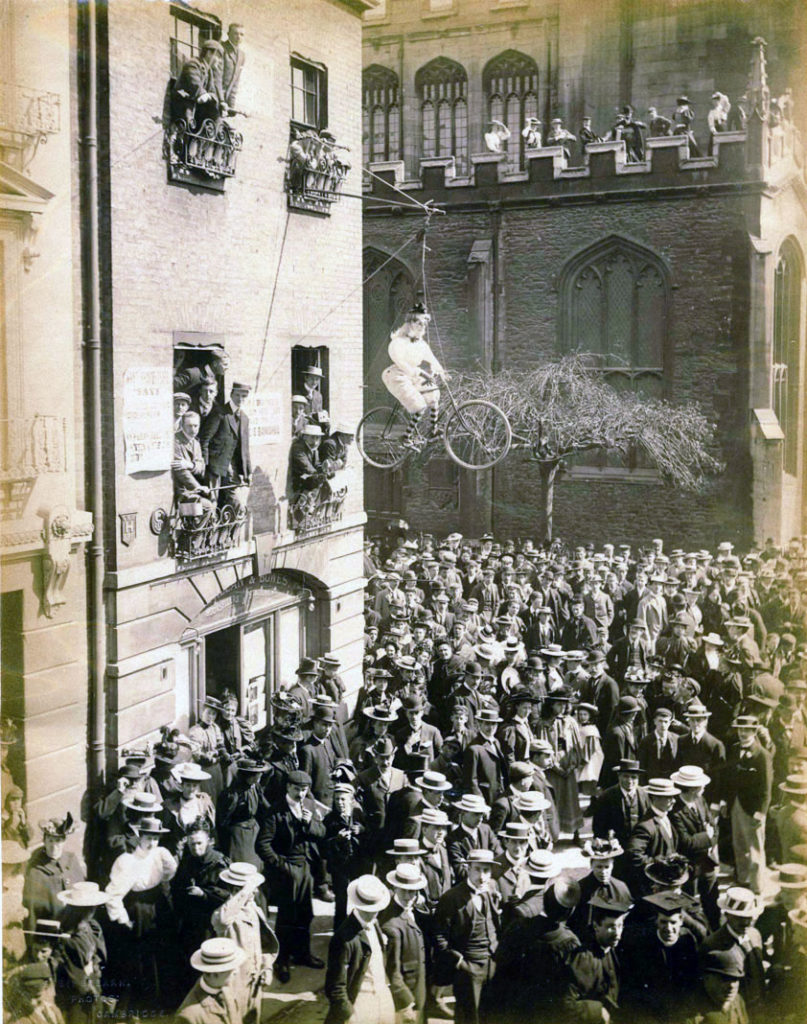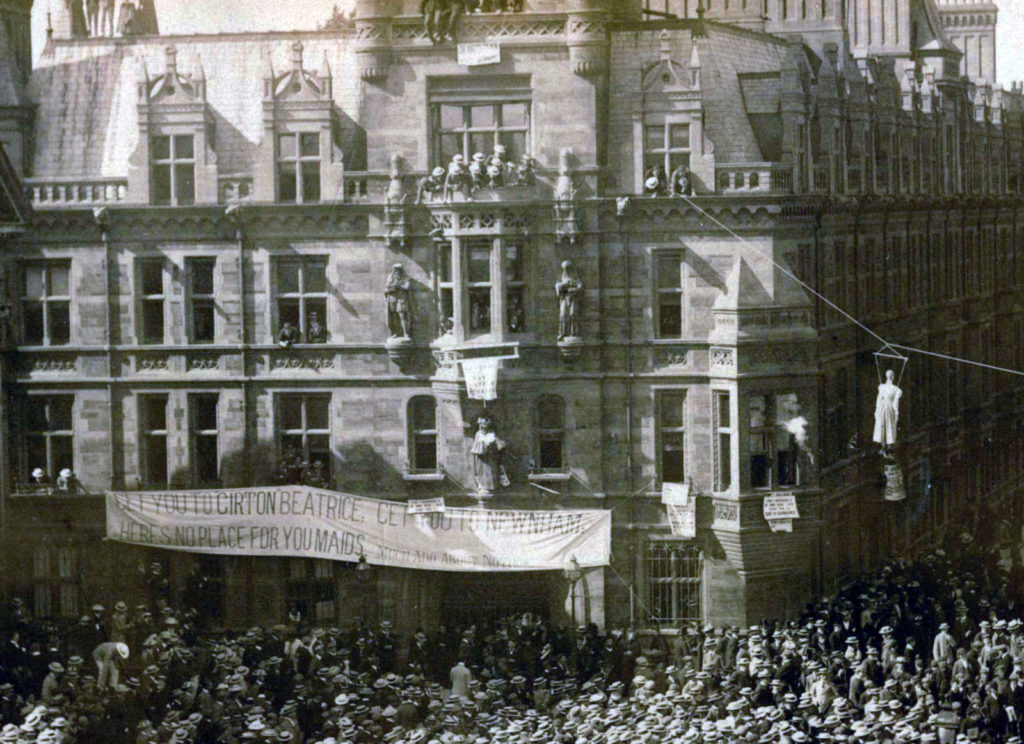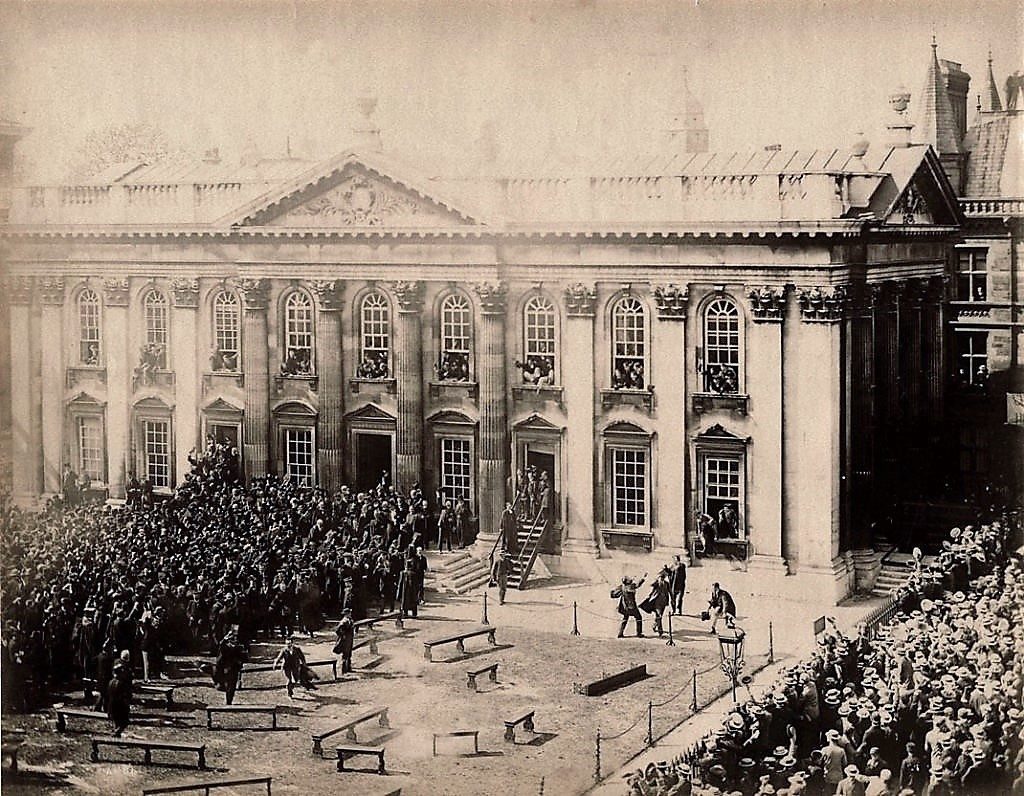 Thomas Stearn (1825-1905), [Cambridge University protest], May 21, 1897. Albumen silver print photoshopped to remove some yellow for easier viewing. Graphic Arts Collection GA2018- in process
Thomas Stearn (1825-1905), [Cambridge University protest], May 21, 1897. Albumen silver print photoshopped to remove some yellow for easier viewing. Graphic Arts Collection GA2018- in process
The Graphic Arts Collection recently acquired three unmounted albumen silver prints taken on May 21, 1897. That was the day when the Cambridge University Senate voted on whether to grant female students the right to receive a full degree. Large numbers of undergraduates, alumni, and staff protested. Degrees to women were rejected and it wasn’t until 1947 that Cambridge reversed this decision.
The above photograph features an effigy of a new, emancipated woman on a bicycle, hung from a window of a bookshop (Macmillan & Bowes at 1 Trinity Street, today the Cambridge University Press bookshop). The second print shows an female figure hung from Caius College across Trinity Street. A large banner parodying Shakespeare reads, “Get you to Girton Beatrice, Get you to Newnham, Here’s No Place for You Maids, Much Ado About Nothing.” [Girton and Newnham were the two female colleges] The final photograph shows the large crowd of jubilant men gathered on the Senate House steps.
Each print has a blind stamp in lower left corner for the photographer Thomas Stearn, who established a studio at 72 Bridge Street in 1886. His wife, sons, niece, and other family members worked in the firm, which finally closed in 1970. If you look closely, a photographer with his camera is visible on the roof of the north aisle of the University Church, accompanied by assistants and a group of women.
 Thomas Stearn (1825-1905), [Cambridge University protest], May 21, 1897. Albumen silver print photoshopped to remove some yellow for easier viewing. Graphic Arts Collection GA2018- in process.
Thomas Stearn (1825-1905), [Cambridge University protest], May 21, 1897. Albumen silver print photoshopped to remove some yellow for easier viewing. Graphic Arts Collection GA2018- in process.
The following account is taken from Teacher Training at Cambridge: The Initiatives of Oscar Browning and Elizabeth Hughes (Routledge, 2004)
[There was] good reason to believe that high education for women . . . was gaining acceptance. Nationally, by 1894 women were receiving degrees from the Scottish universities, Wales, Durham, London and many other universities.
In 1896, Oxford University refused degrees for women at a university vote, but, in Cambridge, 1,234 past students of Hewnham and Girton [Colleges] petitioned the university Senate to have their degrees awarded just like the men, rather than being offered a Tripos ‘certificate’. A highly public campaign by supporters and opponents took place . . . .
The vote to admit women to degree titles was arranged for Friday, 21 May 1897. The Times took the trouble to point out that special trains of the Great Northern Line would leave King’s Cross for Cambridge in time for [graduate students] to register their ‘non-placet’ votes. There was rabble-rousing going on among the undergraduates (who could not vote) for there were near-riots in the streets of Cambridge.
Male undergraduates in one-horse hackney carriages met the [graduates] at Cambridge station and rushed them at break-neck speed along Regent Street, through the marketplace to the Senate House. There they had to press through excited throngs, under the gaze of undergraduates leaning out of Caius College dangling effigies of women students. . . . When at last the result was announced, the women had suffered a crushing defeat. The final vote was 1,707 against women receiving degrees, and only 661 in favour.”
 Thomas Stearn (1825-1905), [Cambridge University protest], May 21, 1897. Albumen silver print photoshopped to remove some yellow. Graphic Arts Collection GA2018- in process
Thomas Stearn (1825-1905), [Cambridge University protest], May 21, 1897. Albumen silver print photoshopped to remove some yellow. Graphic Arts Collection GA2018- in process
50 years after this protest, Cambridge finally accepted women as full members of the University. At Princeton University, it wasn’t until April of 1969 that the Board of Trustees voted to enroll women and the first mixed gender class entered the following fall. In the book world, the Rowfant Club and the Club of Odd Volumes remain closed to women.

Pingback: Science and Identity: Hertha Ayrton – Victorian science